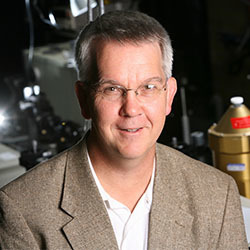

Paul W. Bohn has been named the recipient of the 2017 American Chemical Society (ACS) Analytical Division Electrochemistry Award for his contributions to the field of electrochemical analysis, specifically extending the traditional science into new areas — in Bohn’s case nanofluidic electrochemistry in low-dimensional nanostructures, electrochemistry of atomic-scale conductors and electrochemically tunable surfaces.* The award will be presented at the Division of Analytical Chemistry’s award ceremony during the ACS fall national meeting Aug. 20-24, 2017, in Washington, D.C.
A 1977 graduate of the University, Bohn returned to Notre Dame in 2006 where he now serves as the Arthur J. Schmitt Professor of Chemical and Biomolecular Engineering, director of the Advanced Diagnostics and Therapeutics initiative and professor of chemistry and biochemistry.
*Bohn is being honored for his foundational contributions to the field of electrochemical analysis:
He was the first to observe electrically-actuated gating action in nanocapillary array membranes (NCAMS), which are used to control molecular transport. He also established the use of metallic structures in nanofluidic architectures, allowing for simultaneous coupling of electrokinetic injection, plasmonic detection, electrochemistry, and molecular self-assembly. This integration of working electrodes into nanochannels enables highly efficient linking of mass transport to electrochemistry and results in devices with extremely high conversion and selectivity. Bohn’s work on nanofluidic devices also lead to a new sensing paradigm where a bipolar electrode that pairs self-induced redox cycling in nanopore arrays with a remote fluorigenic reported reaction provides an optical readout of optically dark electron transfer reactions.
Additionally, Bohn’s group developed a unique microfluidic-electrochemical approach to the growth of atomic-scale junctions. These junctions exhibit quantum conductance states resulting in extremely high sensitivity to molecular adsorption – in the case of Lewis bases done to < 5 molecules. Building on this work, Bohn developed a frequency-domain fluctuation spectroscopy measurement of single chemical events at the junctions that provides observation of the behavior of extremely small collections of matter (~1000 molecules). He has also utilized changes in molecular adsorption at metal-liquid interfaces due to resistivity to map electrochemical reactions onto surfaces to achieve electrochemical gradients leading to a new class of controlled surface architectures. Research groups around the world have used this approach to create unique architectures to control both physical and chemical processes.
The author and coauthor of more than 260 publications, Bohn’s work focuses on electrochemical nanotechnology, integrated nanofluidic and microfluidic chemical measurement strategies for personal diagnostics and correlated chemical imaging, especially of microbial communities.
Bohn has received numerous awards throughout his career, including the 2010 Theophilus Redwood Award from the Royal Society of Chemistry (RSC); the 2006 Research Team Award from the U.S. Army Construction Engineering Research Laboratory; the 2005 Bomem-Michelson Award from the Coblentz Society, presented to scientists who have advanced the techniques of vibrational, molecular, Raman or electronic spectroscopy; the 2004 Spectroscopy Society of Pittsburgh Award, which recognizes outstanding contributions in the field of spectroscopy; and the 1997 Spectrochemical Analysis Award from the ACS. He is the only person to receive both the Electrochemistry Award and the Spectrochemical Analysis Award from the ACS.
He holds six patents issued in technologies related to his research. In addition, he has delivered more than 300 invited lectures at universities, national laboratories and industrial laboratories throughout the world. He has also served as a consultant for companies both in the United States and in Europe.
Bohn is a fellow of the American Association for the Advancement of Science, the RSC, and the Society for Applied Spectroscopy. He is also a member of the ACS.
For more information, visit the Bohn Research Group.
— Nina Welding, College of Engineering, and Rebecca Hicks, Department of Chemistry and Biochemistry
Originally published by at conductorshare.nd.edu on February 10, 2017.